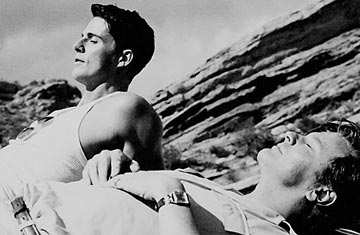
Still from Tom Ford's A Single Man, starring Colin Firth
(2 of 2)
Helen (Ally Sheedy) is a self-sufficient Hollywood screenwriter. Her soft-touch sister Joy (Shirley Henderson) keeps getting visits from dead boyfriends (including ex-Pee-wee Herman Paul Reubens). And Trish (Alison Janney), whose convicted pedophile husband (Ciaran Hinds) is about to be released from jail, has found a new beau, the solid, stolid Harvey (Michael Lerner), whose touch makes her "feel wet, all over." That doesn't please Trish's son Billy (Dylan Riley Snyder), who's also troubled to learn that his father is still alive. "I just wanted you to grow up free and happy," Mom explains, "as if he were dead." Well, everybody has problems.
Most directors take conventional scenarios and lay on comedy or pathos with a trowel. Solondz (who also did Welcome to the Dollhouse, Storytelling and Palindromes) creates worlds suppurating with unspeakable domestic horror and lends them the benison of tragicomic sympathy. Whatever domestic crimes the people close to you may have committed, in the end they're family and you have to try to understand them. This sense of connection, despite all, and the pitch-perfect playing of Solondz's large cast, makes Life During Wartime one of the year's best films, in whatever year it ultimately finds theatrical release.
The Bad Lieutenant — Port of Call: New Orleans, directed by Werner Herzog
"What's an iguana doing on my coffee table?" wonders Nicolas Cage as Lt. Terence McDonagh in this dark, daft, vagrantly intoxicating melodrama. It's a sequel of sorts to Abel Ferrara's 1992 Bad Lieutenant, which starred Harvey Keitel as a nameless, coke-addled sadist who has visions of Jesus. Director Werner Herzog — who made great movies in the '70s, and whose oneiric documentaries landed him on this year's TIME 100 list — says he never saw the Ferrara film, and simply worked from a script by William Finkelstein, who's written more than 100 episodes of cop shows (Law & Order, NYPD Blue, Brooklyn South, Cop Rock). Anyway, McDonagh is a good lieutenant: during Hurricane Katrina, he dove into the floodwaters to save a drowning prisoner; and for his efforts got severe back pains and an addiction to prescription drugs. Besides, McDonagh's visions are reptilian: an alligator on the highway, and that living-room iguana.
The new Bad Lieutenant isn't a film to cherish, but for Cage fans it marks a welcome return to his early days, before he became a conventional leading man in Jerry Bruckheimer films. In his young prime Cage was a weird, tortured actor with highly eccentric impulses; you never knew if he'd punch a wall or eat the flowers. Here he trashes half of lower Louisiana and rips the breathing tube out of an old lady's nose. Both narcotized and energized by his drug regimen, he confronts everybody with the intense stare of a man trying desperately to stay awake, like Robert Mitchum at the end of a long night and too many tokes. But whether he's playing it stricken or stuporous, Cage gives an oddly compelling tutorial in Method acting. Note to budding thespians: Don't try this onstage.
The Joneses, directed by Derrick Borte
As the perfect family foursome — Kate (Demi Moore) and Steve (David Duchovny) and their teen kids Jenn (Amber Heard) and Mick (Ben Hollingsworth) — motor toward their new suburban home, Steve smiles and says, "We are gonna do some serious damage in this town." Damage? Their upmarket neighbors instantly fall in love with the Joneses and all their cool stuff: the golf clubs, electronics, cosmetics. These nice folks have everything, and everyone else wants it all. Is it affordable? We'll worry about that later.
In movies, no family is perfect. We get a hint of that as Steve leaves Kate to sleep in a separate bedroom, and then Jenn tiptoes in to have sex with him. (When Kate breaks up the trust, Jenn says, "Sorry, Dad.") Yes, the Joneses have a secret; and no, they're not vampires, exactly. Professional leeches is more like it.
Tone is all in a social fable, and first-time writer-director Derrick Borte shows an impressive command of mood and pace. He doesn't push your face into the message of conspicuous consumerism; he lets the characters and actors breathe, allows viewers to detect the toxic undertaste in their own good time. In its amiable, ambling way, The Joneses is a zeitgeist film: it says as much as a Michael Moore screed about the American way of debt. It's also a feature-long joke about Hollywood's mania for product placement.
